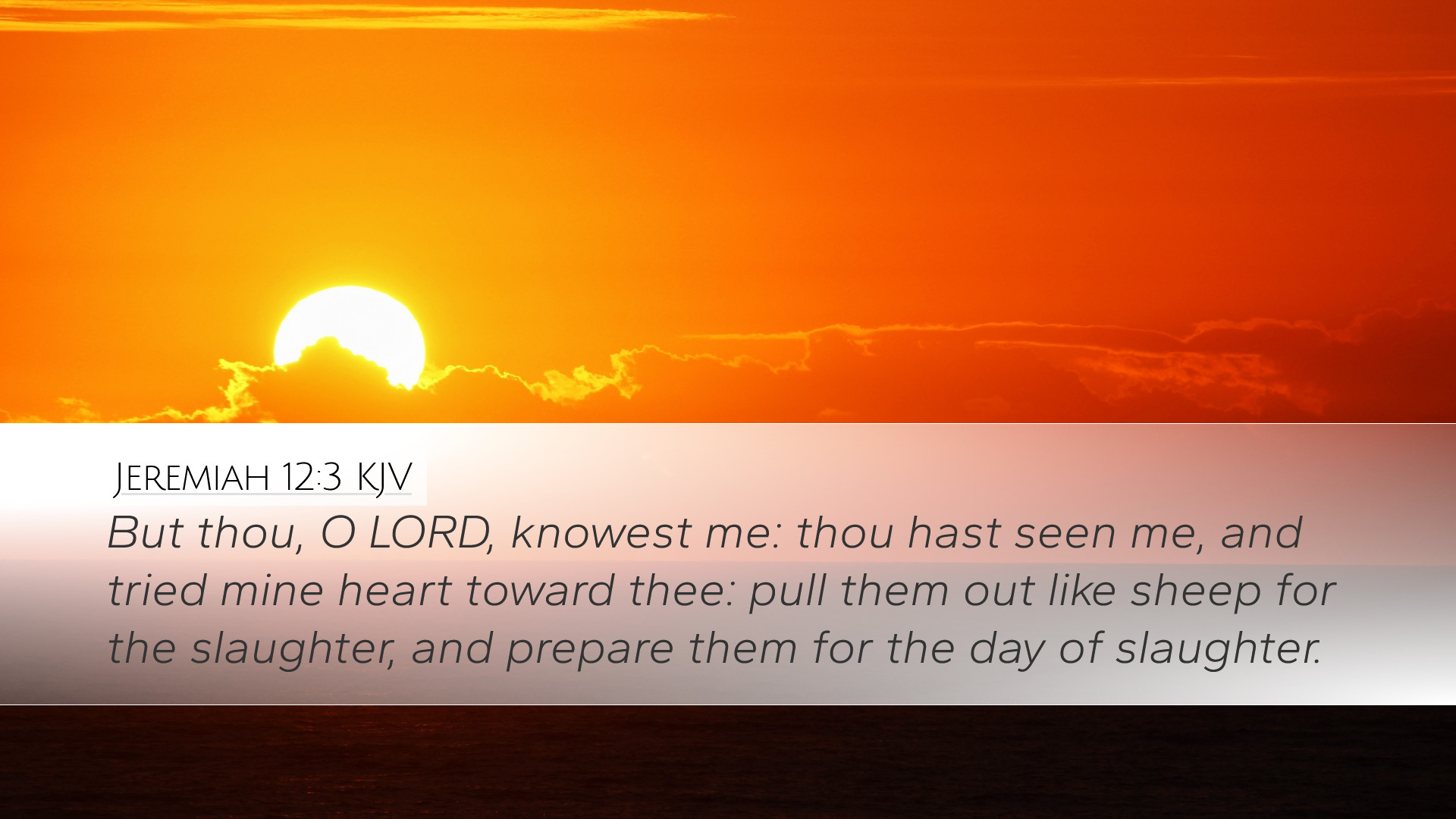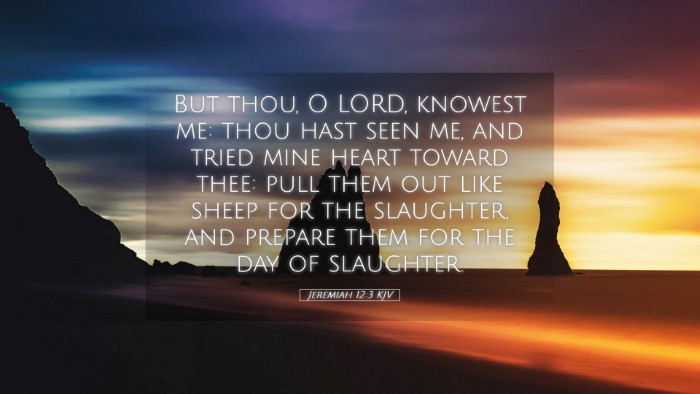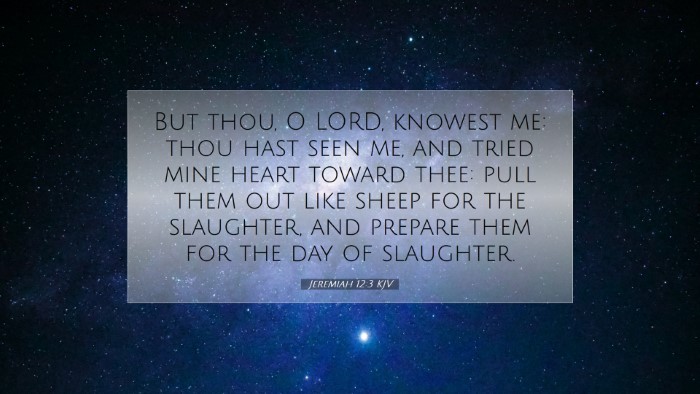Commentary on Jeremiah 12:3
Jeremiah 12:3 states, "But you, O Lord, know me; you see me and test my thoughts about you. Drag them off like sheep for the slaughter and set them apart for the day of slaughter." This verse reveals profound themes of divine knowledge, justice, and the anguish of the prophet as he brings his grievances before the Lord.
Context and Background
Jeremiah was known as the "weeping prophet," and much of his ministry occurred during a tumultuous period in Israel's history. The backdrop of his prophecies consists of impending judgment and the spiritual decline of the people of Judah. As he reflects on the prosperity of the wicked and the suffering of the innocent, he wrestles with profound theological questions about God's justice and the apparent flourishing of those who scorn divine authority.
Insights from Matthew Henry
Matthew Henry's commentary emphasizes the intimate relationship between God and His servants. He notes that Jeremiah, in his distress, turns to God with the confidence that God is aware of his sincerity and struggles.
- Divine Knowledge: Henry highlights that God's omniscience isn’t merely theoretical but is pivotal for prayer and intimacy with God. Jeremiah’s plea reaffirms that he is known by God, which lends authenticity to his request for understanding and justice amidst his turmoil.
- Accountability of the Wicked: When Jeremiah invokes imagery of slaughter, it represents his desire for divine retribution against the oppressive and unjust. Henry articulates this as a necessary acknowledgment of God's justice within a deeply corrupt society.
Insights from Albert Barnes
Albert Barnes provides a more analytical view on the implications of this plea. He elaborates on the rhetorical nature of Jeremiah's lament and its significance in portraying the emotional struggles faced by the prophet.
- Testing of Thoughts: Barnes interprets that the testing of thoughts is not merely a reflection on Jeremiah's mental state but also an indication of divine scrutiny. God weighs the desires and intentions of the heart, which is a recurring biblical theme that underscores accountability before God.
- Call for Justice: Barnes warns against interpreting Jeremiah's call for justice in a vindictive sense. Instead, it is framed within the context of longing for the establishment of divine righteousness on earth.
Insights from Adam Clarke
Adam Clarke provides an exposition that delves into the prophetic role of Jeremiah and the weight of his burdens. He emphasizes the relational aspect of Jeremiah’s complaint to God.
- Plea for Recognition: Clarke notes that Jeremiah's appeal is not only one of personal suffering but also about the national and communal injustice faced by his people. His identification with the plight of the innocents shows the depth of his prophetic calling.
- Imagery of Sacrifice: The mention of "drag them off like sheep for the slaughter" serves as a striking metaphor. Clarke interprets this as a prophetic foreshadowing of the consequences that befall the people due to their persistent rebellion against God.
Theological Themes
Jeremiah 12:3 encapsulates several theological themes that resonate deeply with the Christian faith:
- Divine Sovereignty: The verse acknowledges God's supreme authority and omniscience, indicating that He discerns the true intentions of His people.
- Human Suffering and Justice: The struggle against the perceived prosperity of the wicked raises vital questions regarding human suffering in light of God's justice.
- The Role of the Prophet: The emotional and spiritual burden carried by prophets like Jeremiah illustrates the weight of intercession and the call to advocate for truth and righteousness.
Applications for Pastors and Theologians
The implications of Jeremiah 12:3 for pastoral ministry and theological study are significant:
- Encouragement in Suffering: Pastors can draw on this verse to offer counsel to those who face injustice or spiritual distress; reminding them that God knows their plight.
- Justice as a Divine Attribute: This scripture underscores the necessity of advocating for God's justice in the face of wrongdoing and challenges believers to maintain integrity in their judgments.
- Living with Integrity: For theologians, understanding the prophetic nature of lamentation in Jeremiah invites a broader exploration of how genuine grievances can be brought before God in prayer and worship.
Closing Thoughts
In sum, Jeremiah 12:3 serves as both a testimony of God's intimate knowledge of His people and a call to reflect deeply on issues of justice and human suffering. The insights drawn from the classic commentaries of Henry, Barnes, and Clarke provide valuable perspectives that elucidate the complexities inherent in this passage. As we engage with the text, let it remind us of the urgency of seeking divine justice while also leaning into the relational depth we have with our Creator.


